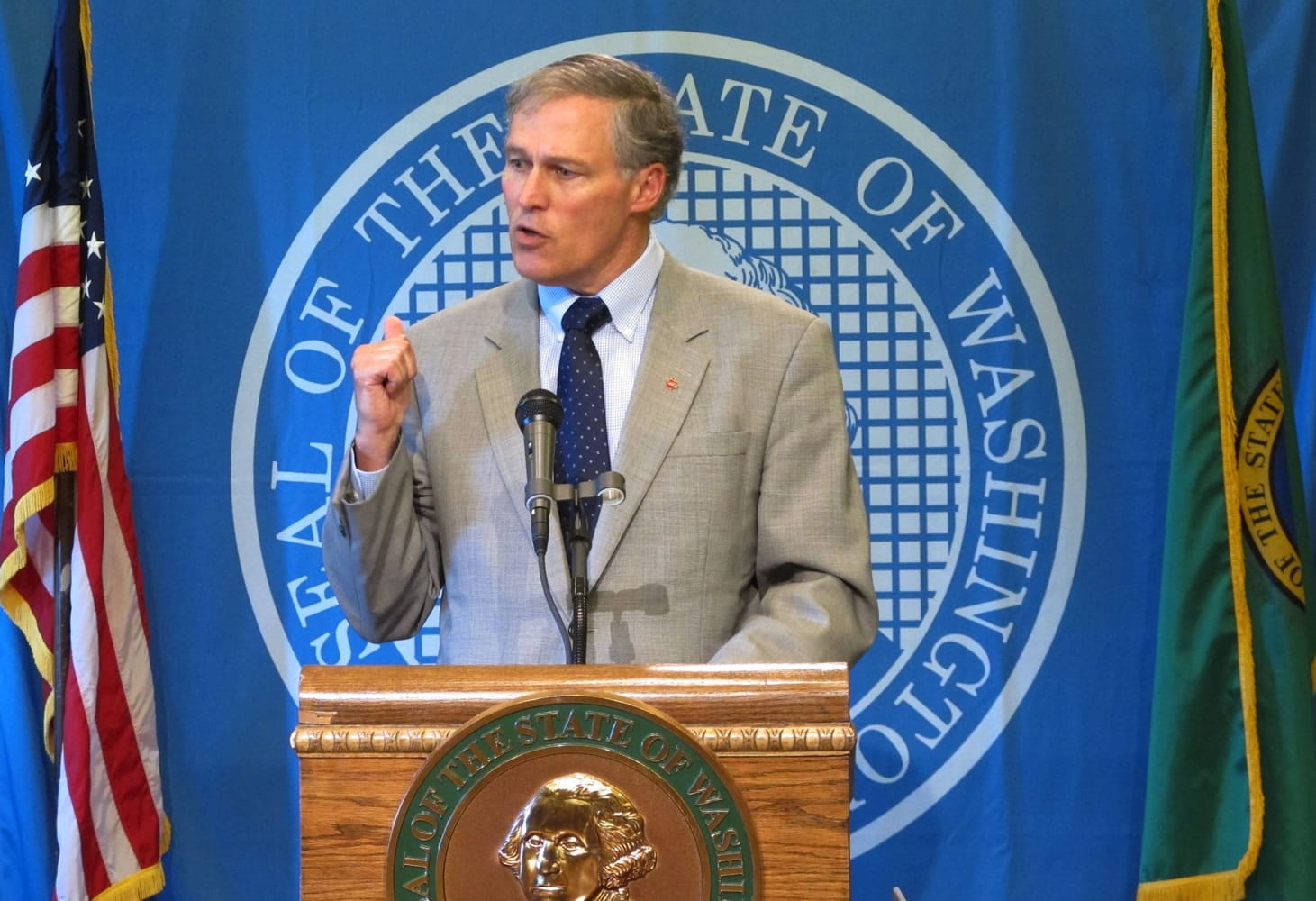OLYMPIA — Gov. Jay Inslee had some lofty goals during his first legislative session, including broad plans to expand government revenue, a transportation funding package and policy bills related to abortion, gun control and immigrant access to financial aid.
None of them passed, and even some of the successes that Inslee had over nearly six months of work were watered down versions of what he initially sought.
Looking back on the session, Inslee touted that the state was able to add $1 billion to the education system — something that was a goal of political leaders in both parties and part of a Supreme Court mandate. He also cited new investments in clean energy and a climate bill as successes, although his primary climate bill was amended to remove language about the human impact on climate change.
Perhaps the purest success that Inslee had was the advancement of a plan to protect water supplies in the Yakima River Basin, something he said combined the priorities of economic development and environmental protection. The state also adopted the Medicaid expansion under President Barack Obama’s health care law, with little resistance.
Inslee spokesman David Postman also pointed to three bills that were part of the governor’s jobs package. One creates an advisory panel that will provide guidance to the governor on education issues in the fields of science, technology, engineering and math. One is a technical fix to ensure ongoing work for the Joint Center for Aerospace Technology Innovation. A third bill monitors the previously launched development of a one-stop portal for business interactions with state government.
Inslee said some of his priorities were thwarted by a Senate majority that is comprised of two conservative Democrats and 23 Republicans. Inslee, for example, had pushed for the passage of a bill that would have required insurers to cover abortions.
A majority of senators had signed a letter supporting the abortion measure, but it never got a vote in the chamber. Inslee said that was an indication of how Senate leaders wouldn’t allow the philosophical middle to develop.
“To me, this is exhibit `A’ about how the majority coalition has failed in its commitment to bring moderation, and bipartisanship and consensus-building to the Washington state Senate,” Inslee said.
Here’s a look at the areas where Inslee didn’t win over lawmakers:
o TRANSPORTATION: Inslee said this week that you can’t overstate the economic impact of not having a new transportation funding package, and the failure of the plan also irked officials in Oregon who had wanted to see the package pay Washington state’s share for the new Columbia River Crossing. The House had passed a $10 billion package, but the Senate declined to take it up for a vote despite some late lobbying from the governor’s office.
o GUN CONTROL: Inslee personally lobbied on the floor of the state House — a chamber controlled by Democrats — to build support for a plan that would expand background checks on gun sales. It didn’t work, as the measure didn’t even get a vote in the chamber, and one Republican bemoaned the fact that Inslee had given out her personal cell number so that former U.S. Rep. Gabrielle Giffords could also make a pitch.
o DREAM ACT: Democrats sought to build momentum for a plan that would make young immigrants living in the country without legal permission eligible for college financial aid. While it passed the House and was publicly promoted by Inslee, it also didn’t get a vote in the state Senate.
o DRUNKEN DRIVING: Lawmakers did pass a measure strengthening laws targeting repeat violators of Washington’s impaired driving law, but it was substantially scaled back from a plan Inslee had put forward that the governor had deemed the “most aggressive, the most effective, the most ambitious program to reduce drunk driving on our roads.” Lawmakers declined to increase mandatory minimum jail times, citing cost constraints, and did not adopt Inslee’s proposal that would have prohibited people from purchasing alcohol for 10 years after a third conviction on drunken driving.
o TAXES: Inslee proposed some $1 billion in revenue from tax changes, including the permanent extension of business and beer taxes that were about to expire. He also proposed eliminating or limiting a variety of tax exemptions. In the end, neither of those packages passed. Lawmakers did raise revenue from changes in estate and phone taxes, but those alterations were largely in response to court rulings.
Inslee touted that the final budget restores social services cuts that were initially in the Senate budget. He said lawmakers still need to find a sustainable funding source as they look to add more money to the education system in the future.
“I would consider this a good start, but we have a long ways to go,” Inslee said.



